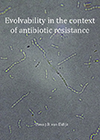PhD defence Timo van Eldijk
Timo van Eldijk (TRÊS)
Promotores: Prof. F.J. Weissing, Prof. O.P. Kuipers (GBB), Prof. G.S. van Doorn

Evolvability in the context of antibiotic resistance
The rise of antibiotic resistance is an example of ‘evolution in action’: bacterial populations adapt to a toxic environment by evolving resistance. However, luckily, bacterial populations are not always able to adapt to survive antibiotic exposure. What determines if a bacterial population will develop resistance? To answer this question, we need to understand the mechanisms that enable bacterial populations to undergo adaptive evolution. In other words, we need to understand ‘evolvability’ in the context of antibiotic resistance.
In this PhD thesis, I use a combined theoretical and experimental approach to investigate three mechanisms that underlie bacterial evolvability: mutation rates, gene regulatory network architecture, and horizontal gene transfer. Regarding mutation rates, I show that evolution tailors these to the local conditions. Under stressful conditions, mutation rates should increase, thus enhancing bacterial evolvability. Experimentally, I demonstrate that the mutation rate towards antibiotic resistance is indeed impacted by environmental temperature, a finding of potential clinical relevance. Regarding gene regulation, I show using a model that the architecture of a gene regulatory network tends to evolve in such a way that the phenotypic effects of genetically random mutations are biased towards adaptive outcomes, which facilitates rapid adaptation. Regarding horizontal gene transfer, I examined the role that plasmids play in the emergence of antibiotic resistance using experimental evolution. Contrary to expectations, I showed that in the context of my experiment plasmids do not enhance the rate of resistance evolution. The thesis closes with a discussion of the clinical relevance of the insights obtained.
